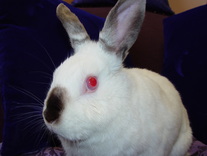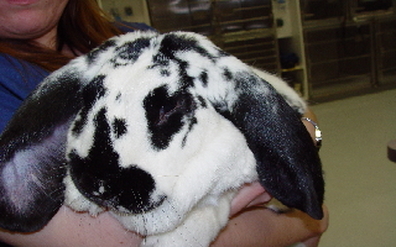Getting to know your new bunny
- Imagine what the world looks like to this bunny. She is surrounded by a new environment, and there is a big, strange-smelling animal that is always looming over her. She has no idea you are trying to be friendly. Her “hard wiring” says: “AAAAAAAA!!!” It is going to EAT MEEEE!!!!” Imagine yourself in her bunny slippers: No one speaks her language, she has been taken from her family and perhaps the only home she has ever known. She has no idea whether you plan to love her, cage her forever, or eat her! You must gradually and patiently win her trust. It can take an hour, a day or even weeks or months. It depends on the personality of the individual rabbit, and on your willingness to be patient and loving.
- You and bunny should be together in a private, quite room. No other pets. No distractions.
- Have a little treat, such as a bit of carrot, apple or banana or a little pinch of oats in your hand.
- Lie on your tummy on the floor and let the bunny out of her hutch. (IMPORTANT: The hutch door should be at ground level. So that bunny can come and go as she pleases. Having to grab the bunny every time you want to play can undo hours of patient trust building! If the hutch door swings down to from a ramp, be sure to cover it with a towel or cotton mat so that bunny doesn’t catch her foot in the wire and break a leg!
- Don’t expect her to approach you right away. Remain quiet and patient, even it if takes an hour or more. Rabbits are naturally curious, and eventually, she will come over to sniff you.
- Resist the temptation to reach out and pet the bunny. Instead, let her sniff you, hop on you and just get to know your smell. This will teach her that you are not a threat.
- If the bunny finds the treat, hold it while she nibbles. Resist the urge to pet if she is shy!
- Do this every day. Gradually, you can start to pet the bunny by giving her a gentle “scratch” on the forehead or behind the eyes (bunnies love this!). Never force anything, and never chase the bunny. This, too, will only undo all the patient sitting you have done to gain her trust. Eventually you and your bunny will be doing mutual, ground level snuzzling and cuddling that is as close to Nirvana as one can get on earth. (Bunny kisses are a sign of affection: it’s not the salt!)
- Once the bunny learns that you are a friend, she will bond very strongly to you. It is important to have him neutered or her spayed once he or she reaches sexual maturity, because otherwise she or he will want to make love to everything. (See our other handouts for more information.)

Rabbits and Children
In most cases, children and rabbits are not ideal companions. A rabbit’s delicate skeleton and prey-species nature predisposes him or her to be fearful of the attentions of an active, happy child, however well meaning. It takes a very special, mature child, who is willing to follow all of the above steps, to make a good companion for a rabbit.
Some people are disappointed that the rabbit is “not turning out to be the sort of pet we wanted for our kids.” Rather that being disappointed that the rabbit is not what you expected (a few rabbits enjoy being held; most don’t), take this opportunity to teach children respect for a new kind of animal and its natural personality. If the kids really want something to carry around, they need a stuffed toy—not a live rabbit.
An adult should always be the primary caretaker of the rabbit. Most young children do not have the patience and sense of responsibility necessary to properly care for a rabbit: parents should be willing to step in and provide proper care if the child forgets to do so. A well cared for rabbit can live 10 years or more, so parents should be ready to take over the care giving duties of the teenager who goes off to college, leaving Thumper at home with the family.
She’s a Sentient Being – Not a Toy
Now look at your rabbit with learned eyes. She is not a stuffed toy, nor is she an overgrown hamster. She is a highly intelligent creature who will become a loving, loyal member of the family if you allow her to be what she is – a rabbit! If you can do that, you are in for the most delightful companionship of a lifetime. Welcome to the Family of the Rabbit!
In most cases, children and rabbits are not ideal companions. A rabbit’s delicate skeleton and prey-species nature predisposes him or her to be fearful of the attentions of an active, happy child, however well meaning. It takes a very special, mature child, who is willing to follow all of the above steps, to make a good companion for a rabbit.
Some people are disappointed that the rabbit is “not turning out to be the sort of pet we wanted for our kids.” Rather that being disappointed that the rabbit is not what you expected (a few rabbits enjoy being held; most don’t), take this opportunity to teach children respect for a new kind of animal and its natural personality. If the kids really want something to carry around, they need a stuffed toy—not a live rabbit.
An adult should always be the primary caretaker of the rabbit. Most young children do not have the patience and sense of responsibility necessary to properly care for a rabbit: parents should be willing to step in and provide proper care if the child forgets to do so. A well cared for rabbit can live 10 years or more, so parents should be ready to take over the care giving duties of the teenager who goes off to college, leaving Thumper at home with the family.
She’s a Sentient Being – Not a Toy
Now look at your rabbit with learned eyes. She is not a stuffed toy, nor is she an overgrown hamster. She is a highly intelligent creature who will become a loving, loyal member of the family if you allow her to be what she is – a rabbit! If you can do that, you are in for the most delightful companionship of a lifetime. Welcome to the Family of the Rabbit!

